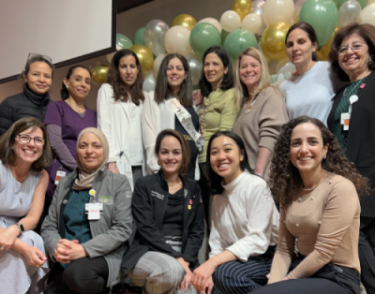Pediatric Infectious Diseases Fellowship Program
The Pediatric Infectious Diseases Fellowship is a three-year, ACGME-accredited program that fosters a learning environment where fellows become exceptional clinicians, educators, and investigators, uniquely prepared to address evolving challenges in pediatric infectious diseases and lead innovation in this critical healthcare field.

Pediatric Infectious Diseases fellows, faculty and staff at a baby shower for fellow Yara Neaimah (back row, center).
The Pediatric Infectious Diseases Fellowship at UTHealth Houston is dedicated to training future generations of leaders in pediatric infectious disease care, research and education. Our teaching team provides specialized expertise in diagnosing, treating and preventing infectious diseases in children, offering advanced clinical and research opportunities that serve patients, the community, and healthcare professionals alike. Our fellowship program stands out by integrating a comprehensive curriculum focused on immunology, epidemiology, microbiology, antibiotic stewardship, and infection control, all in the context of patient care. The Pediatric Infectious Diseases Division is committed to excellence in both research and clinical practice, with unique strengths in HIV, vaccines, antimicrobial resistance, infection control, and international health supported by collaborations across a multidisciplinary network.
Objectives
- Training and direct experience in appropriate use of antimicrobial agents in a variety of clinical settings, their mechanisms of action, pharmacokinetics and potential adverse reactions as well as underlying disease states and immunosuppressive therapies
- Structured curriculum features progressive teaching, research and consultative experiences equipping fellows to provide optimal care and consultation for pediatric patients with infectious diseases
- Hands-on experience with clinical pharmacology, diagnostic procedures and the interpretation of results (for example, bronchoscopy, thoracentesis, lumbar puncture, aspiration of abscess cavities and more)
- Access to a wide spectrum of research in infectious diseases and international health; opportunities in HIV research (including pediatric and adolescent patients with HIV), group A streptococcus, vaccines, meningitis, and antimicrobial resistance from laboratory research to translational research
- Professional skill development, healthy peer interaction and communication techniques with patients, families and other health care providers
Quick Overview
Requirements
- J1-VISA, USA Green Card, or USA citizenship
- Graduation from an approved American medical or osteopathic school or permanent certification by the Qualification Board of the Educational Council for Foreign Medical Graduates (ECFMG)

